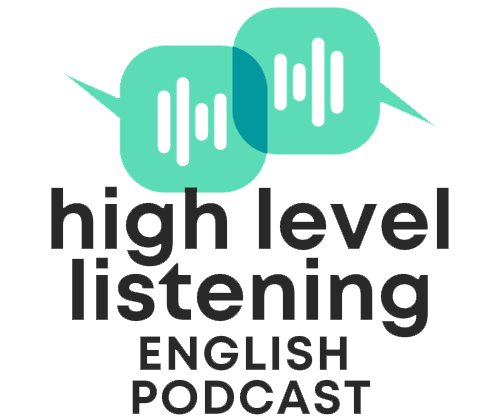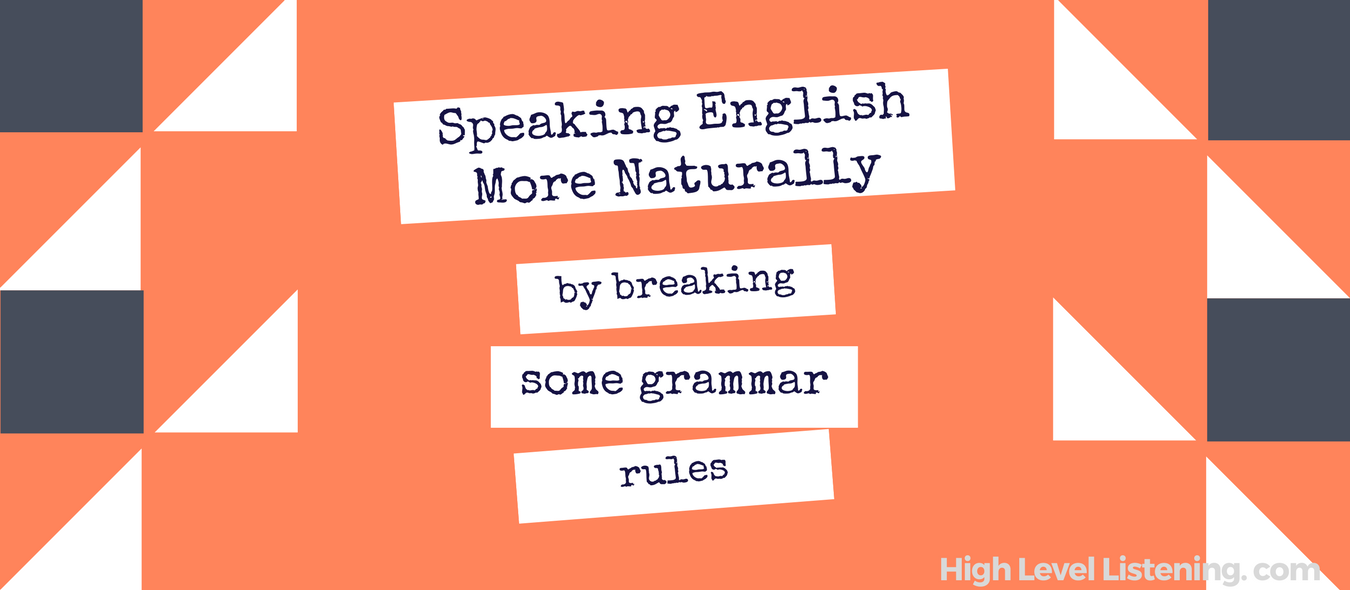5 Tips for Speaking more Naturally in English
Breaking English Grammar Rules to Sound More Natural and Relaxed
Learning English is hard. You learn lots and lots of rules, you study the grammar and the perfect way to create sentences, and THEN you listen to native speakers and you start to realize:
Native English speakers don’t always follow the rules.
Now, think about it. English speakers have been studying English since kindergarten and have had 13-17 years of English classes, but speaking English in a natural way is more than studying the rules in a book. It’s about listening to and learning the way that people use English every day, and how speaking can change from casual to more formal, depending on the situation.
Most ESL textbooks are too formal for casual conversations.
Most textbooks are best for academic English or formal writing, but what if you want to go to a pub after work in the UK with some colleagues? What if you want to do post-graduate work in Canada and hang out with the nicest people in the world? What if you want to backpack through New Zealand and travel and meet people from all over the place?
Most native speakers don’t speak formal, structured English. It’s not as friendly, open or relaxed.
Now, we’re not trying to break ALL of the rules, because that makes it difficult to communicate. However, we’re gonna give you 5 grammar rules that are easy to break to help you start speaking more naturally in English.
Here’s an overview:
- Using ‘They‘ as a singular pronoun
- Using the ‘Impersonal You‘ instead of the pronoun ‘One‘
- Changing ‘Much‘ and ‘Many‘ to ‘A lot of’ or ‘Lots of’
- Changing relative pronouns: ‘Which/Who/Whom/Where’ to ‘That‘
- Using ‘Have to‘ and ‘Have got to‘ instead of ‘Must‘
You should feel more confident breaking these rules in casual English conversation, but don’t tell your English teacher 😉 Enjoy!
They as a Singular Pronoun
Academic English Rule: Do not use ‘their’ as an alternative to ‘his or her’; ‘their’ should be used only when referring to a plural subject.
Formal, structured English tells us that they, their and them are only used for plural subjects/objects:
- Maria and James are meeting us later. I think they’re off work around 5.
*This is completely natural and normal. It even follows the rules, awesome!
Academic English also tells us to use ‘he or she’ and ‘his or her‘ in order to be grammatically correct.
- A good teacher takes his or her job seriously.
- A teacher should always keep his or her classroom organized.
- I don’t know who I’m working with. I hope he or she will be a good partner.
But here’s the problem: most English speakers think that this is excessively formal, and I guarantee you most people (unless you LOVE grammar) don’t follow this rule. So let’s use a trick that most native English speakers use in speaking:
We use ‘they’ as a singular pronoun, especially when you want to stay gender-neutral (including all men and women in the statement) or you don’t know the gender at all.
Let’s listen to some examples:
[wonderplugin_audio id=”475″]
Dialogue 1:
Well, personally, if a uni (college) student wants to get a job straight away, they need to start applying for jobs and internships way before they graduate.
Yeah, I agree, they’d have to, it’s so competitive out there, you* have to start early.
*the impersonal you, which we’ll talk about soon, can be used for people in general, not just you, directly*
Dialogue 2:
Hey, I think someone left their bag in class today. Should I just leave it here?
Well, you can always bring it to the lost and found. I’m sure they’ll come pick it up later when they realize it’s missing.
Dialogue 3:
Hey, I finally got a callback on that job I interviewed for.
Oh nice, what’d they say?
Well, she told me me that I’m qualified for the next round of interviews and that I should come in Monday morning.
Here are some more examples:
Who brought all the extra snacks? They’re my new favorite person.
Who’s parked behind me? They’re gonna have to move so I can get out.
Who bought the tickets? I owe them money.

Even Facebook uses it across its millions of English users.
The Impersonal You
Using ‘you’ to mean ‘people in general’, not the pronoun ‘one’
Academic English: Use the word ‘one‘ as an impersonal pronoun that stands for the average person.
- He’s the type of person one would respect.
*I’d only see this in academic writing.
The impersonal “you” sounds much more natural and relaxed than the pronoun “one.”
- He’s the type of guy you’d respect.
Listen to other examples of using the impersonal you:
[wonderplugin_audio id=”476″]
Dialogue 1:
So what’s Colchester like?
It’s small, it’s pretty quiet. But if you’re into history, then there’s lots of stuff you can do actually, we’ve got a big roman castle in the middle of the town, so you can go to the museums in there, you can see some skeletons and some swords and stuff like that. There’s pubs all over the place, so if you get a bit thirsty you can go to a pub, and try some ales, you can try some ciders, you can try… local ciders which are really really nice, yeah, there’s quite a lot to do.
Dialogue 2:
Have you been to that little bar down the street?
Yeah a few times actually, I mean, if you’re really into craft beer, they’ve got a pretty good selection, but if you just kinda wanna go and hang out by yourself, you can do that too.
Dialogue 3:
Hiya, what did you get up to last night?
Actually I had a lot of fun last night, we met up with some friends of a friend and they were really cool.
Yeah? What are they like?
They’re just, kind of… the kind of people that, you know, you can invite anywhere, and they would get along with everybody.
Here’s another very popular example #thatmomentwhen for when you want something to be very relatable for a lot of people in general (or you can use to replace yourself as well! Very versatile.)

Using A lot of and Lots of instead of Much and Many
Another quick and easy cheat is to avoid the words much and many. We all know the rules, but they can be really confusing sometimes.
We’re supposed to use much with stuff that’s hard to count. Stuff like coffee, tea, rice, stuff, etc.
We’re supposed to use many with things that are easy to count. Things like cups, bowls, people, things, etc.
Here’s where I see a lot of students get confused:
Money is uncountable, so we’re supposed to follow the rules:
- I have much money.
*This sounds very unnatural.
People are countable: 1 person, 2 people, 3 people, etc…
- I see many people.
*We’re following the rules, but this also sounds very unnatural.
So let’s make it easy on everyone:
- I have a lot of money.
Also, I have lots of money. - I see a lot of people.
Also, I see lots of people.
You can use “A lot of” in both situations, making it a lot easier to use, and you won’t sound unnatural or accidentally use the wrong word. Listen to the audio clips for more examples:
[wonderplugin_audio id=”477″]
Dialogue 1:
Hey, I heard you quit your job recently, how’re things going?
It’s been great actually. I have lots of free time now, which means I’ve been spending a lot more money, but I’ve picked up painting again, which is really satisfying. That job just wasn’t for me.
Dialogue 2:
Hey I’m off early today why don’t you come over around 3?
Yeah, I’m not sure if I can make it that early, I’ve got a lot of stuff to do. Maybe like, 4:30, 5?
Sure, totally up to you, there’s usually a lot of traffic near my house around then, though, but it usually clears out by about 6.
Dialogue 3:
Things have been really stressful this week. A lot of people are counting on me to get these reports out in time, but I just dunno.
Yeah, I’ve been there, and yeah I get it, you’ve got a lot on your plate right now. Just try to prioritize and start one thing at a time. I’m sure you’ll get through it!
Who wouldn’t want to be friends with lots and lots of cats?

Using That instead of Which/Who/Whom/Where
Academic English rule: Relative pronouns and relative adverbs introduce relative clauses.
- We use who when referring to people
- The lady who answered the phone wasn’t really that helpful.
- We use which to refer to a thing or an idea, and to ask about choices.
- My cat, which is 15 years old, is still going strong.
- We use whom to replace the object of a preposition/ indirect object
- Tell me more about the girl whom you’ve been dating.
- Where (relative adverb) refers to places and locations.
- Here’s the place where we stayed last year.
It’s great to follow the rules, but wouldn’t it be even easier if we could just use one word to replace all 4?
There is. We just usually use the word “that”. In fact, we use that A LOT.
- The lady that answered the phone wasn’t really that helpful
- My cat, the one that’s 15 years old, is still going strong.
- Tell me more about the girl that you’ve been dating.
- Here’s the place that we stayed at last year.
Side note: whom is really old-fashioned, and it’s either used ironically or not at all.
Extra side note: You can confidently use that in similar situations and sentence structure as the ones we’ve talked about, however it can’t always replace these words in other questions or sentences. For example, Who’s that? Where’s my stuff? It really only works with relative clauses.
Listen to them here:
[wonderplugin_audio id=”478″]
Dialogue 1:
Hey, you know that guy that messaged me yesterday?
Yeah, your brother’s friend, right?
Yeah, he wanted to know more about that house that we rented on vacation. Do you have any of those emails that the owner sent you?
Dialogue 2:
So which apartment are you gonna choose?
Well, I love the one that’s been completely renovated, but the rent’s a lot more expensive. I think I’m probably gonna go with the one that’s a little further from work, but is way under my budget.
Dialogue 3:
So me and that guy decided to break things off.
Wait, the one that you’re in all those pictures with?
Yeah, I mean, we dated a little, but things never really clicked.

Using Have to/ Gotta vs Must
I hear the word Must from my students a little too often. You might see it on a formal set of rules: “Passengers must remain seated during take-off and landing”… or from a very strict and scary teacher: “Students MUST be quiet during testing”, but that can sound a little scary and formal.
More naturally, especially in American English, we use the words have to or gotta / have gotta.
Have to is very normal and natural. Gotta and Have Gotta (I’ve gotta, She’s gotta) are very casual (but never rude or impolite).
Check out the examples here:
[wonderplugin_audio id=”479″]
Try them both: Have to vs Gotta/Have Gotta
Example 1 Have to: Hey boss, I have to leave a little early on Thursday, I’ve got a doctor’s appointment at 2:30.
Example 2 I’ve gotta: Hey boss, I’ve gotta leave a little early on Thursday, I’ve got a doctor’s appointment at 2:30.
Dialogue 1:
What’s your schedule like tomorrow?
Well, I’ve gotta drop the kids off at school around 8:30, then I have to be home by 9 to meet the cable repair guy. Do you wanna meet for lunch?
Yeah, that sounds great, I’ve just gotta run a few errands in the morning, then I’m free.
Dialogue 2:
So what are we supposed to do exactly?
Well, you’ve gotta write up the reports summary, and then I’ll do the final edits and send them to the clients. We just have to submit them by Friday morning each week so they can be shipped in time.
Dialogue 3:
Alright, I’m finished, what do I have to do now?
We’ve still gotta finish up here, but you’re welcome to take a quick break if you need to.

We hope you feel confident sounding more casual in our tips for speaking more naturally. You can break a few rules, and it actually makes you sound BETTER in English, crazy, huh? Any questions or suggestions, let us know in comments below!
Kat and Mark





